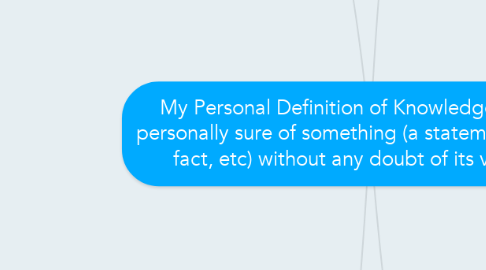
1. Philosopher that Champions Definition: Rene Descartes
1.1. Main question for Descartes definition of knowledge: What can I know for certain?
1.2. Completely revolutionized Epistemology from the Greek philosopher's definition of knowledge being from the world of 'forms' where knowledge can only be obtained through reason.
1.3. Created the 'Descartes Method' of reasoning to formulate his theories
1.3.1. He accepted nothing as true, cast aside all personal beliefs about everything, and accepted nothing as true other than what he could clearly recognize as true
1.3.1.1. Method of 'systematic doubt'
1.3.2. Wouldn't trust his senses or his reason and would only accept what he could be absolutely certain of
1.3.2.1. Confident he could only know one thing for certain. He expressed this certainty in the Latin Sentence: "Cogito ergo sum"
1.3.2.1.1. Translates to: "I think, therefore I am."
1.3.2.2. Therefore his definition of knowledge is that one can only have knowledge of what they are absolutely sure of, and that one's senses could not be trusted to evaluate whether they are sure of something or not.
1.3.3. Maintained that the human mind could come to know things independently of physical reality
1.3.3.1. People came to this knowledge by using the power of their own reason
2. Philosopher that Champions Definition: Immanuel Kant
2.1. Took some parts of Descartes philosophy and modified it into his own
2.2. The central feature of his work and philosophy was the conscious, the way that humans processed ideas
2.2.1. Believed that one;s ideas are their own and other people's ideas are theirs, and that their ideas do not just pop into someone else's mind
2.2.1.1. Based on this, Kant proposed, and summed up his theories, with the phrase "unity of consciousness"
2.2.1.1.1. Believed a person's consciousness (their thoughts, beliefs, hopes and fears , etc) were put together in that person's mind and in no one else's
2.2.1.1.2. Suggested knowledge is unified in the human mind
3. Philosopher that opposes Definition: Plato
3.1. Compared people's minds to an aviary
3.2. Believed that things that people perceive and experience through the senses are subject to change because these things wear down and can disintegrate over time (i.e. people's tastes can change, beliefs can change based on what people see, etc...)
3.2.1. Because of this, Plato argued knowledge acquired through the senses is unreliable because people can only create opinions on things in the sensory world.
3.3. Believed only the power of reason, without distraction by senses and bodily needs, can reveal true knowledge
3.3.1. Reason is the tool that provides understanding of the forever unchanging and unseen world of ideas
3.3.1.1. Called this unseen, eternal world "Forms"
3.3.1.1.1. Forms are innate because they exist in every human from birth
3.3.1.1.2. For every object that exists in the material world, the human mind possess a corresponding idea of the object
3.3.1.1.3. Believed the world of forms represented a non-material reality that was superior to humans' earthy and sensory existence
4. Philosopher that Opposes Definition: Aristotle
4.1. Student of Plato
4.1.1. Did not completely agree with Plato's view
4.2. Still accepted that the abstract knowledge of the world of forms was superior to the sensory world,
4.3. However, he believed that all knowledge comes from experience
4.3.1. Knowledge was that experience was the evidence acquired through the senses
4.3.2. Still believed that reason was important and was the characteristic that defined a human being
4.3.2.1. Believed Reason only came into play after people used their senses to experience things
4.3.2.1.1. Therefore, Aristotle's definition of knowledge was that all knowledge comes from sensory experience and reason was used to analyze those experiences

